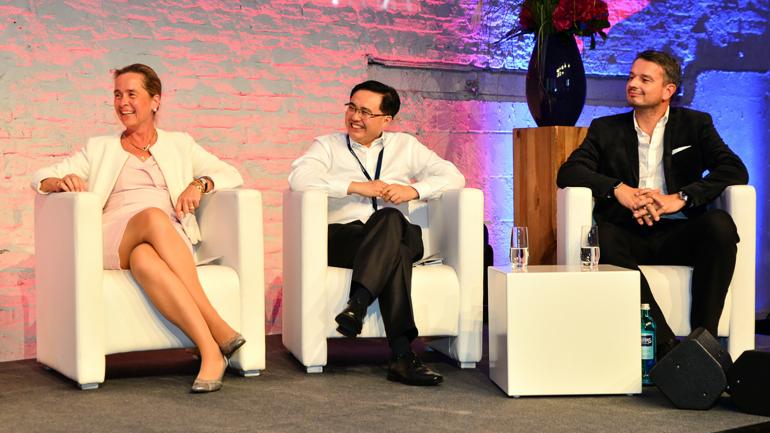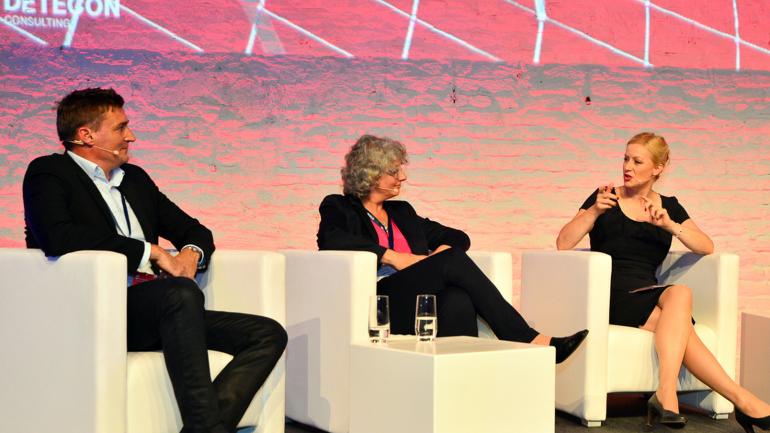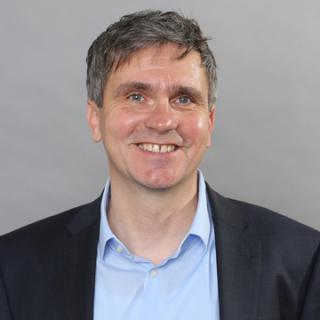Media Information
Premiere: First Detecon Red Carpet Event in Cologne's Dock.One
Join the Ecosystems:
Working Together to Shape a European Path to Digitalization
Indications of a European alternative to American and Chinese approaches appear
Call for agile political processes and cross-organization ecosystems
Panel discussion featuring prominent digitalization experts
Cologne, 19 September 2018. The shaping of a European path to digitalization was the primary subject of discussion during the Red Carpet Event 2018 at Cologne’s Dock.One on 17 September; Detecon International, leading German management and technology consultancy headquartered in Cologne, had invited about 150 guests and clients to attend. Telekom Group’s own management consultancy accompanies national and international clients through the process of digital transformation.
At the focus of the event was the question of what form digital transformation can take in Germany and Europe to avoid losing touch with the leaders in the digitalization race and to secure genuine global relevance despite the highly disruptive activities of the USA on the one hand and the protectionist actions of China on the other. One of the key conclusions of the discussion was that a European approach must build to a high degree on digital re-engineering of previously established businesses as well as on strong ecosystems across organizational and institutional boundaries. The general feeling of all the participants was that the digital competitiveness of Germany and Europe in a global comparison was by no means so badly off; it simply functions in a fundamentally different way than in California or China.
“Digitalization is changing entire societies, whereby the drivers of our global economic system deal with it in different ways,” noted Dr. Heinrich Arnold, CEO at Detecon, in describing the challenges. “The ‘Silicon Valley’ model primarily presumes creative destruction, i.e., digital platforms with global reach will rise as new competitors to established companies. The Chinese model, in contrast, relies on a home market that is massively fostered by the state and that at the moment has proved to be especially strong as a competitor. If Germany and Europe are to stand up to these dominant digital economic concepts, a primary task will be to act with determination and to bring about the digital enhancement of the European business model, which includes technologies of the future and European strengths. Partnerships and ecosystems are decisive factors in achieving global relevance, and examples such as Berlin or Beersheba in Israel demonstrate that it is possible to build up a globally relevant innovation ecosystem within a single decade,” emphasized Heinrich Arnold to the audience.
“Digital transformation has just now begun to move, very slowly, in Germany. We need agile political processes and sharper focus on radical innovations instead of limiting ourselves to incremental adjustments,” demanded Professor Dietmar Harhoff, director atthe Max Planck Institute for Innovation and Competition, in his keynote address. “What we need now is to identify new forms of value creation. Achieving this cannot depend on a single player; on the contrary, we need close cooperation among many players from politics, academia, and business. Or to express it in a single sentence: Let’s join forces to build flourishing digital ecosystems!” advised Harhoff.
All the guests of the Red Carpet were called upon to adopt the slogan “Join the Ecosystems” and to talk to one another about the development of concrete strategies. In the same vein, decisive fields of action such as connectivity, artificial intelligence, co-innovation, company rebuilding, or mobility as a service were debated from the perspective of European challenges in seven round table sessions conducted parallel to one another.

During the concluding panel discussion, digitalization experts such as Bernhard Gold (Iris Capital), Lilian Matischok (Robert Bosch GmbH), Dr. Jeanette von Ratibor (CEO Verimi), Feng Xingliang (NRW.INVEST China), and, by video, Thomas Sattelberger (member of the Bundestag) were joined by Heinrich Arnold, Detecon CEO, to assess the chances of European ambitions.
Bernhard Gold, partner at the venture capital investor Iris Capital, emphasized: “The European venture activities and the startup market are in much better shape than it might appear. In 2017, a record high of €17 billion in venture capital was invested. We have a vigorous market, people with enormous talent, and a growing number of European unicorns. We need to be more patient; even Silicon Valley, along with the important, massive exit market, did not appear overnight, but took decades to reach its current status.”

Bernhard Gold even sees a tendency for Europe to take the lead in aggressive digitalization activities for industry and high technology. “The Europeans should have more self-confidence; the more complex the technology, such as the achievement of high quality in machine construction or embedded systems, the less important is the advantage that can be realized by agile, American trial and error, e.g. for a customer app.”
According to Detecon CEO Heinrich Arnold, it is above all vital to master two requirements critical for companies in the future digital business in Germany and Europe: “First, we must develop a lot more know-how. AI or, in the larger sense, the Artificial Intelligence of Things (AIoT), will be joined by technologies such as (autonomous systems) and AR (augmented reality) to trigger nothing less than technology shocks because they will change real-time effects and forecast mechanisms on a giant scale. Second, European key arguments such as security and reliability must define the typical European differentiation factor even more strongly and have an impact as a competitive advantage.”
“European companies must not only focus on financially over-optimizing their current business as a cash cow. Concretely, greater effort is needed to create the freedom to shape digital activities and to make the appropriate strategic investments,” continued Heinrich Arnold. “Every European company must find a way to build up digital value creation with equal weight to its physical value creation that can look back on such long traditions and has simply been highly successful. By doing so, new digital solutions can appear in the form of hybrid business models.”
Your Contact


